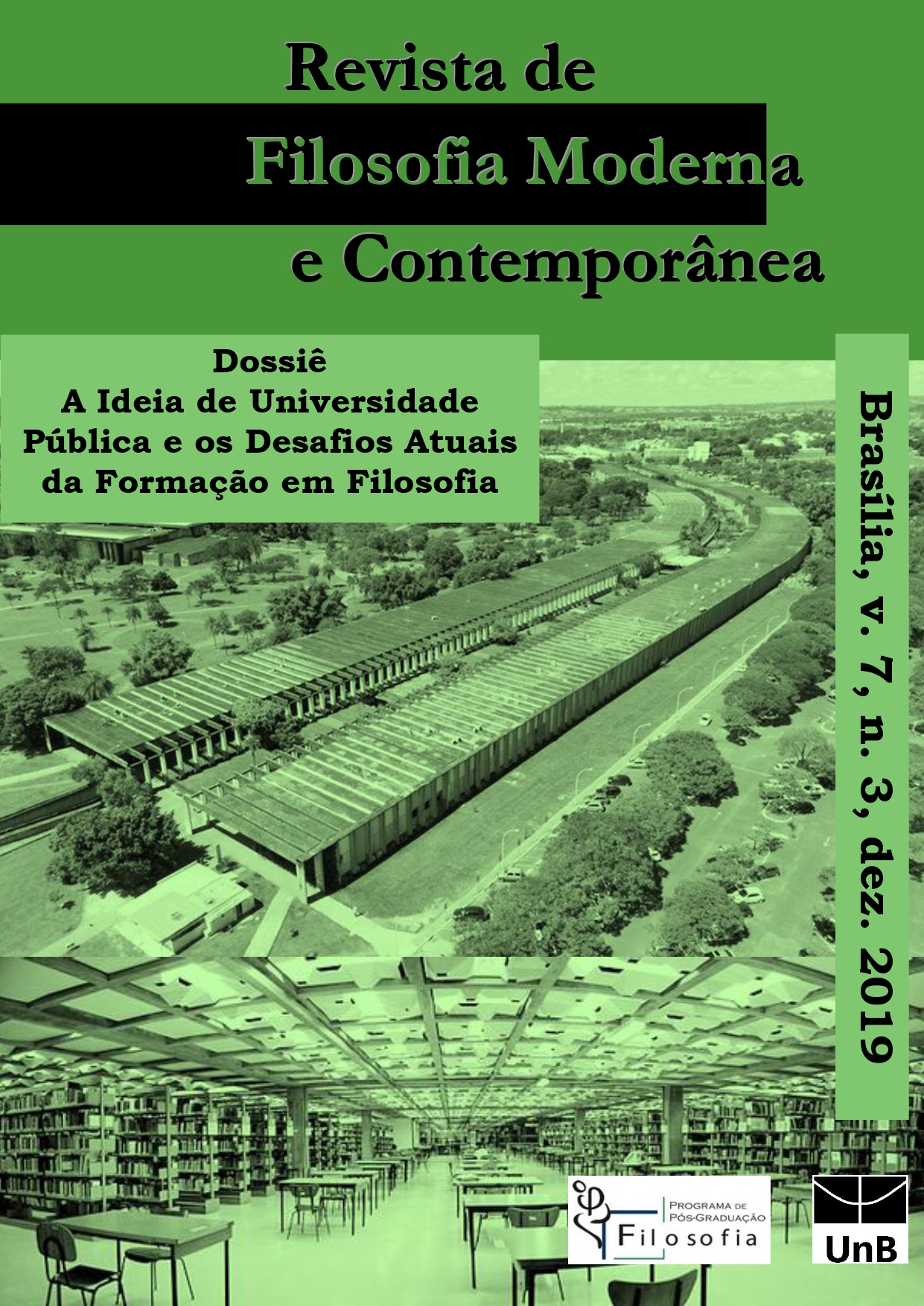Passage and Progress in Kant's Anthropology
DOI:
https://doi.org/10.26512/rfmc.v7i3.28542Keywords:
Passagem, Progresso, Liberdade, Natureza, AntropologiaAbstract
This article aims to analyze how anthropology can represent a way of realization of the passage between freedom and nature in Kant's thought. Thus, we want to make it clear that the problem inaugurated in the introductions to the Critique of Judgement about the possibility of a passage between the immeasurable gulf of freedom and nature becomes possible not only from the reflections made on the faculty of judgment and its implications in judgments of taste over the beautiful and in the judgments of purpose but also from the thesis of progress presented in the Kant's philosophy of history which receives one of its forms of realization in matters involving human nature (anthropology).
Downloads
References
KANT, Immanuel. Gesammelte Schriften. Hrsg.: Bd. 1-22 Preussische Akademie der Wissenschaften, Bd. 23 Deutsche Akademie der Wissenschaften zu Berlin, ab Bd. 24 Akademie der Wissenschaften zu Göttingen. Berlin 1900ss;
______. Anthropologie in pragmatischer Hinsicht. Trad. Clélia Aparecida Martins. São Paulo, Iluminuras, 2006 (AA 07);
______. Briefe. Bd. 10-13;
______. Grundlegung zur Metaphysik der Sitten. Trad. Paulo Quintela. Lisboa: Edições 70, 2007. (AA 04);
______. Idee zu einer allgemeinen Geschichte in weltbürgerlicher Absicht. Trad. Rodrigo Novaes e Ricardo R. Terra. São Paulo: Martins Fontes, 2016. (AA 08);
______. Kritik der praktischen Vernunft. Edição Bilíngue. Trad. Valério Rohden. São Paulo: Martins Fontes, 2003. (AA 05);
______. Kritik der reinen Vernunft. Trad. de Manuela Pinto dos Santos, 5ª Edição. Lisboa: Fundação Calouste Gulbenkian, 2001. (A 1781, B 1789);
______. Kritik der Urteilskraft. Trad. de Fernando Costa Mattos. Petrópolis: Editora Vozes; Bragança Paulista: Editora Universitária São Francisco, 2016. (AA 05);
______. Textos Seletos. 7 ed. Petrópolis: Vozes, 2011. (Coleção textos filosóficos);
FIGUEIREDO, Vinicius B. Crítica e Antropologia em Kant. In. SANTOS, L. R. dos. Was is der Mensch?/ Que é o homem? Antropologia, Estética e Teleologia em Kant. Lisboa: Centro de Filosofia de Lisboa, 2010;
KLEIN, Joel Tiago. Kant e a Ideia de uma história universal. São Paulo: Edições Loyola, 2016;
LOUDEN, Robert B. Kant’s impure ethics: from rational beings to human beings. USA: Oxford Universtiy Press, 2000;
______. “A Segunda parte da Moral”: a Antropologia Moral de Kant e sua relação com a Metafisica dos Costumes. Revista Ethic@, Florianópolis, vol 1, nº 1, p. 27-46, 2002;
OLIVEIRA, Manfredo. A. de. A antropologia na filosofia de Kant. Revista de Ciências sociais, vol. IX, nº 1 e 2 pág. 127-140, 1978;
Downloads
Published
How to Cite
Issue
Section
License
Copyright for articles published in this journal is retained by the authors, with first publication rights granted to the journal. By virtue of their appearance in this open access journal, articles are free to use, with proper attribution, in educational and other non-commercial settings.


